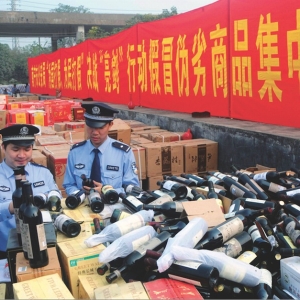It may have been a false alarm, and nobody since then has gone on the record to say that local wine has been counterfeited. But the issue is of deep concern to many Kiwi exporters, including winemakers. James Medina, the executive officer of Hawke’s Bay Winegrowers Association, is in no doubt of the threat of counterfeiters, particularly in China. “It’s going to be an issue at some point, for someone,” he says. “It’s not ‘if’, but ‘when’.”
The statistics of counterfeiting make alarming reading. The most recent OECD estimate dates from 2007, when it says cross-border counterfeiting totalled around US$250 billion annually and almost two percent of global trade was counterfeit. Others put the figure much higher: the International Chamber of Commerce says it’s US$1 trillion annually.
The wine industry is a major victim. Last year, a French newspaper claimed one bottle in five is counterfeit. Today, French and Italian growers are the main targets of counterfeiters, but as New Zealand’s reputation grows, the risk increases.
There are several ways of protecting against counterfeiting. The most common method is using difficult-to-reproduce stickers that authenticate a product, similar to the way money is identified with special paper, watermarks and metal strips. But this method is expensive and takes an expert to definitively say something is real or isn’t — hardly a consumer-friendly solution.
Local company Expander is taking a different approach: placing an individual identifying code on every single product. Expander uses QR codes, which have had limited uptake in New Zealand, but are widely used in Asian countries, including China, and can be scanned with any smartphone. Each scan is checked against a database of valid codes so the purchaser can be assured that they’re about to buy the real deal.
Expander’s programme discourages counterfeiters, who will always go after easy targets. CEO Erwin Versleijen puts it like this: “Consumer counterfeiters profit from the reputation built by others, and they don’t particularly care whose reputation they mess with. They make a risk-versus-benefit calculation and, like all criminals, they prey on the weak. If you have protections in place that make it more difficult to copy a product or more likely to be caught — or ideally both — then they’ll target someone else.”
And defending against counterfeiters can have an unexpected, positive upside, he says.
“Actively protecting your brand is a wonderful way of demonstrating to consumers that you care deeply about your product and your reputation,” he says. “You’re kicking off a conversation based on trust, rather than a run-of-the-mill marketing message.”
For Expander, that means taking the opportunity when a product is validated to also immediately provide consumers with useful information like tasting notes, product reviews and the winemaker’s history and terroir. People can also register to receive more information in future, or follow the winemaker on Facebook or Twitter.
Anne-Marie Sutton, general manager of Rapid Labels, has partnered with Expander to offer Expander codes on the labels they print for many Kiwi winemakers. “We think it’s a great idea and we’ll make it as easy as possible for our customers to take advantage of the programme,” she says. “It’s a virtuous circle — the more Kiwi exporters who are protecting their brand like this, the better our reputation will become for all of us. We’d love to see New Zealand exports known as the most credible products on the planet.” ν










